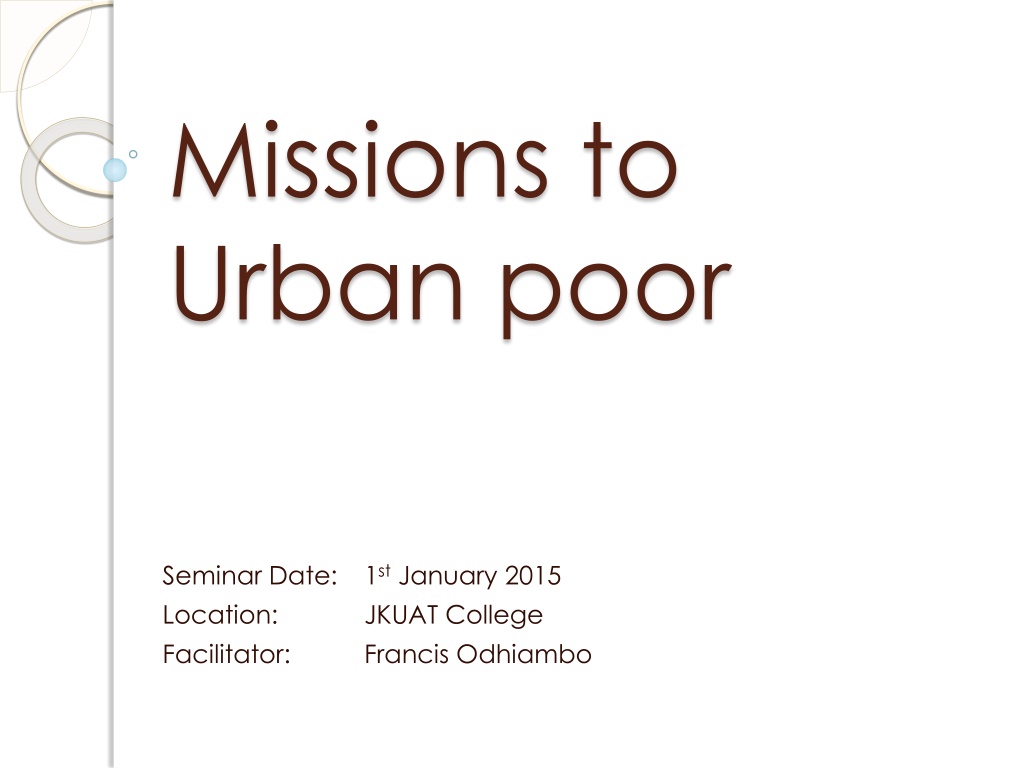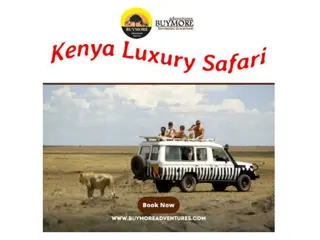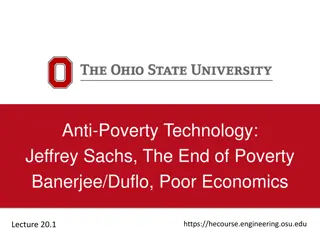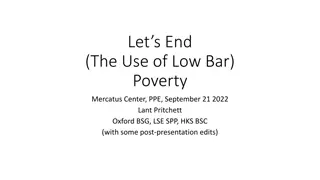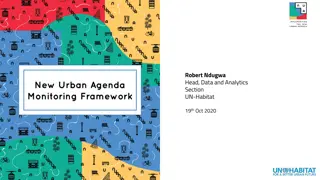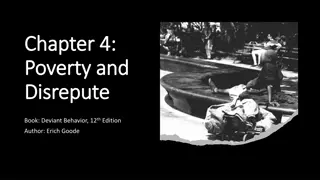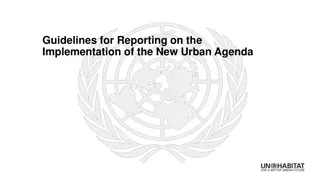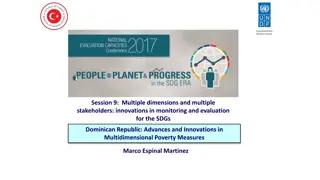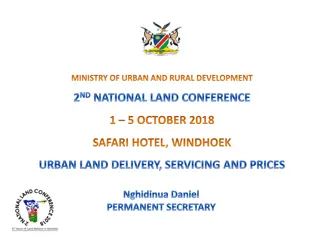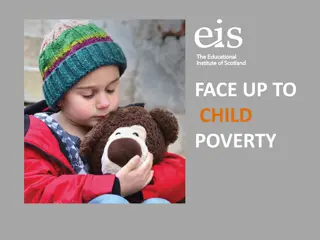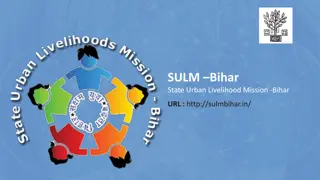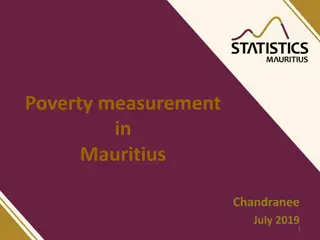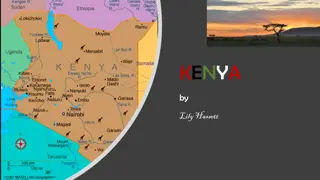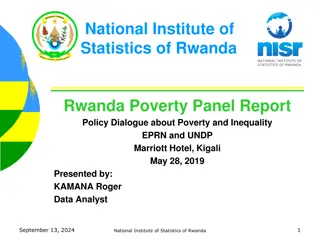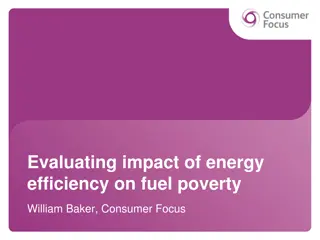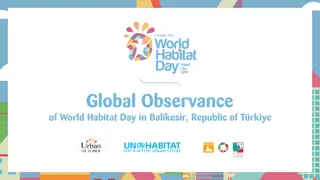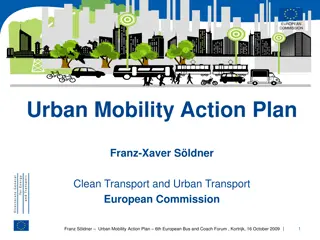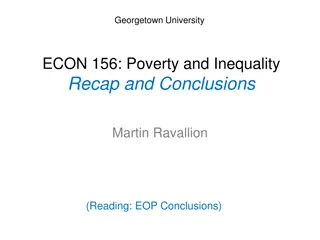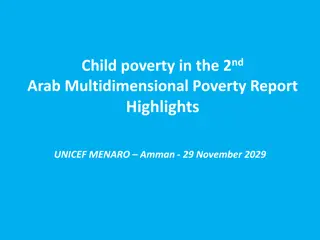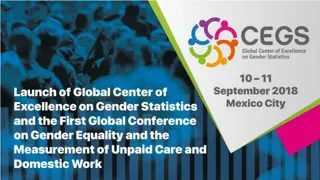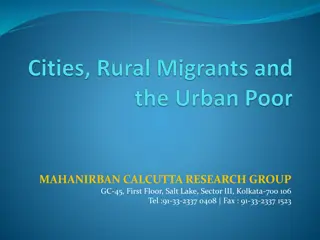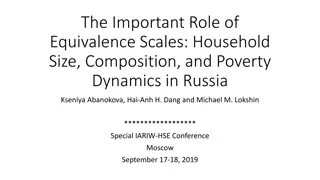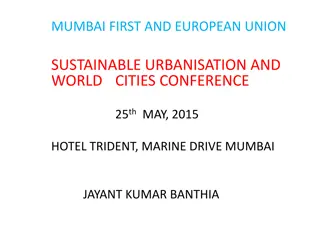Understanding Poverty in Urban Kenya: Challenges and Solutions
Poverty in urban Kenya affects a significant percentage of the population, with many living in informal settlements facing inadequate housing, lack of basic amenities, and limited access to education and healthcare. The urban poor are often employed in low-paying jobs or resort to illegal activities to survive. Addressing this issue requires a comprehensive approach that includes improving living conditions, creating employment opportunities, and providing access to essential services.
Download Presentation

Please find below an Image/Link to download the presentation.
The content on the website is provided AS IS for your information and personal use only. It may not be sold, licensed, or shared on other websites without obtaining consent from the author. Download presentation by click this link. If you encounter any issues during the download, it is possible that the publisher has removed the file from their server.
E N D
Presentation Transcript
Missions to Urban poor Seminar Date: 1stJanuary 2015 Location: Facilitator: JKUAT College Francis Odhiambo
Contents About poverty in Kenya About the urban poor Steps to consider Our Story Summary Discussion plus Q & A
About poverty in Kenya About 1% of Kenyans are considered rich or upper class (total household income of shs500,000 and above) About 6% of Kenyans considered middle class (shs40,000 to 500,000) About 93% of Kenyans considered lower class and poor 43% make up working poor (sh10,000 40,000) 40% make up under employed, working only 2-3 days a week 10% make up destitute poor who are jobless and starving Data according to survey conducted in 2014 by a leading research company
About the Urban Poor Between a third to a half of urban population in Kenya live in poverty. Nairobi alone has approx 2 million slum dwellers Most of the poor live in rural areas but this is expected to change in next 10 years with the current trend of urbanization of poverty or the poor moving to urban The rural poor believe they can make it in the urban setting. An urban move is also viewed positively by the rural even though few succeed
About the Urban Poor The informal settlements are densely populated Many unemployed or underemployed especially youth and women Lots of illegal activities just to survive or support family including commercial sex work/stealing/corruption Most are casual labourers, messengers, watchmen, clerks, commercial sex workers etc Neighbourhoods greatly distressed with many vulnerabilities of health, pregnancies, alcohol & drugs
About the Urban Poor Housing made of temporary materials e.g. mad, iron sheets or timber Owners of structures have quasi legal rights or no rights at all. Most households occupy a single room Water , sanitation, drainages, sewer systems non existent Challenges accessing good medical care Majority drop out of school in mid secondary hence low skills level (others talented but poverty has made them struggle even to have dreams) Electricity not readily available but there are many illegal connections
About the Urban Poor Summary points Life in the slums is a struggle Poverty percentages in the country are very high and growing, with most choosing the urban setting as a new place to settle Despite their situation, their need for the gospel is real God commanded us to remember the poor in Galatians 2:10 Leviticus 23:22 also reminds us to remember the poor Deuteronomy 15:11 I command you to be open handed towards the poor, there will always be poor in the land Proverbs 19:17 If you are kind to the poor you are lending to the lord
Steps to consider Research on the community All slums are different; Have intention to learn; What are the stories of the community Story 1: Pregnant girl who could not take up education bursary Story 2: Commercial sex worker whose survival fear overrides disease and dignity fears Slums upgrade beneficiaries who revert back to slums Record what the stories represent; new insights and actions e.g. Poverty; vulnerability; lack of education; churches; medical care; no employment; housing and sanitation
Steps to consider Re read the scriptures Take questions from the context to the scriptures Retelling their story The individuals should have a new story of transformation Their stories shared are more powerful than your inspirational stories
Steps to consider Incarnation This is a deliberate choice to identify with poor. Desire to enter for Christ s sake into struggles of community and be one of them Jesus took the form of servant and was revealed in human flesh (Philippians 2:5-8) Christ s incarnation is a model for Christian mission Jesus identified with the poor and oppressed To what level are you willing/able to incarnate into the urban poor community to share the gospel?
Steps to consider Incarnation Requires presence in a community; You are incarnational when you communicate gospel from within the realities of a given context If doing church plants Base Church building in the community rather than invite / shuttle people outside of community If doing a short term project Link to a local church/group for continuity Some churches recommend an urban plunge ( a week in the slums living as they live wholly) for their interns. Consider a pastor from within community than imported
Steps to consider Incarnation has some dangers though Careful not to be viewed as a messianic figure Tremendous suffering can overwhelm you and bring despair to you You can also experience a crisis of faith. Story told of missionary who could not believe such poverty existed when they visited and their faith faltered
Steps to consider Incarnation importance To be able to communicate Who God is Where God is today What does God require of us here and now in our circumstance
Steps to consider Social Analysis What has the church or you learnt from the community through their stories and your incarnation Historical issues (how did kibera come about?) this helps as you develop you ministry actions Identify the societal divisions you recognised. They will impact your ministry so do not ignoring them (race /religion /ethnicity/gender) What are the structures and values identified e.g. Education, politics, business, church, cultural. What are the major ones influencing the situation or your ministry work. This can be dynamic from season to season
Steps to consider Take context back to scripture and listen ... Spend time with God on best way to do ministry in view of what you have learnt Trust Him to use and guide you on how He would like to use you in the context...It is His work you are just joining Him (read Experiencing God) Assess your spiritual gifts, they could be clear indicators how you can be involved Be careful not to use all your energy to jump in yet God has been waiting for you to ask how best should you go about it
Steps to consider Going it alone? Careful that you do not take a competition approach with other workers of God For short term projects work with a local church or mission group who can provide continuity Collaborate with other like minded organisations/ churches or individuals for certain ministry work Be the local outfit for the local and international organisations that do not have enough grass root knowledge or interest to implement
Our Story We have three health clinic based in Riruta, Woodley and Olympic in Kibera Over the years we observed a trend that clearly showed a cycle of poverty among the families that visited our clinics The challenges faced by parents 10 years ago are the same for their children as they become parents The cycle is expected to repeat itself through the next generation; unless we do something
Our Story We decided to focus on the areas of medical care; employment opportunities generation; spiritual nourishment Above areas would holistically improve the well being of our target group Income would free them from dependency; church would give them hope through Christ; and medical care would provide a sound health for any economic activity
Our Story We have set up a HUB for the youth called YES HUB. Here they come to fellowship with other, build their life skills and get jobs and jobs trainings: Step 1: Incubation: A 10 week/session relationship building and getting to know them Joint fellowship & discipleship conducted Work based life skills trainings conducted Step 2 Assignment: Youth are attached to jobs based on their competencies and vacancies Some jobs are through companies we have set up e.g. Commercial cleaning through YES Sparkles; Day care stewards ; nurse aids for the palliative care business among others
Our Story Step 3 Mentorship: The youth are assigned mentors Help challenge them to new thinking Hold them accountable and reinforce the learning To walk with them into a new thinking of it is possible Step 4 Graduation: The youth are encouraged to Start own businesses with our support and connections Develop career paths through new jobs To provide pool of new discipleship resources
Summary Research the community Incarnation or some form of... & walk alongside; build relationships Provide a hand up and not a hand out. Empowered and self sustainable (not easy). Are solutions theirs or yours? Beware of despair & be cautions with your expectations . Example of 2 churches planted in Kibera and Rongai by the same mother church. Two years later Rongai has 800peple while kibera has 50people. Careful not to compare, the journeys are different What you view as success may come long after you are gone You may need God to work on you first before you work on the mission to the poor. Be careful to direct them to Christ, you are not the saviour, He is and the transformation is His.
